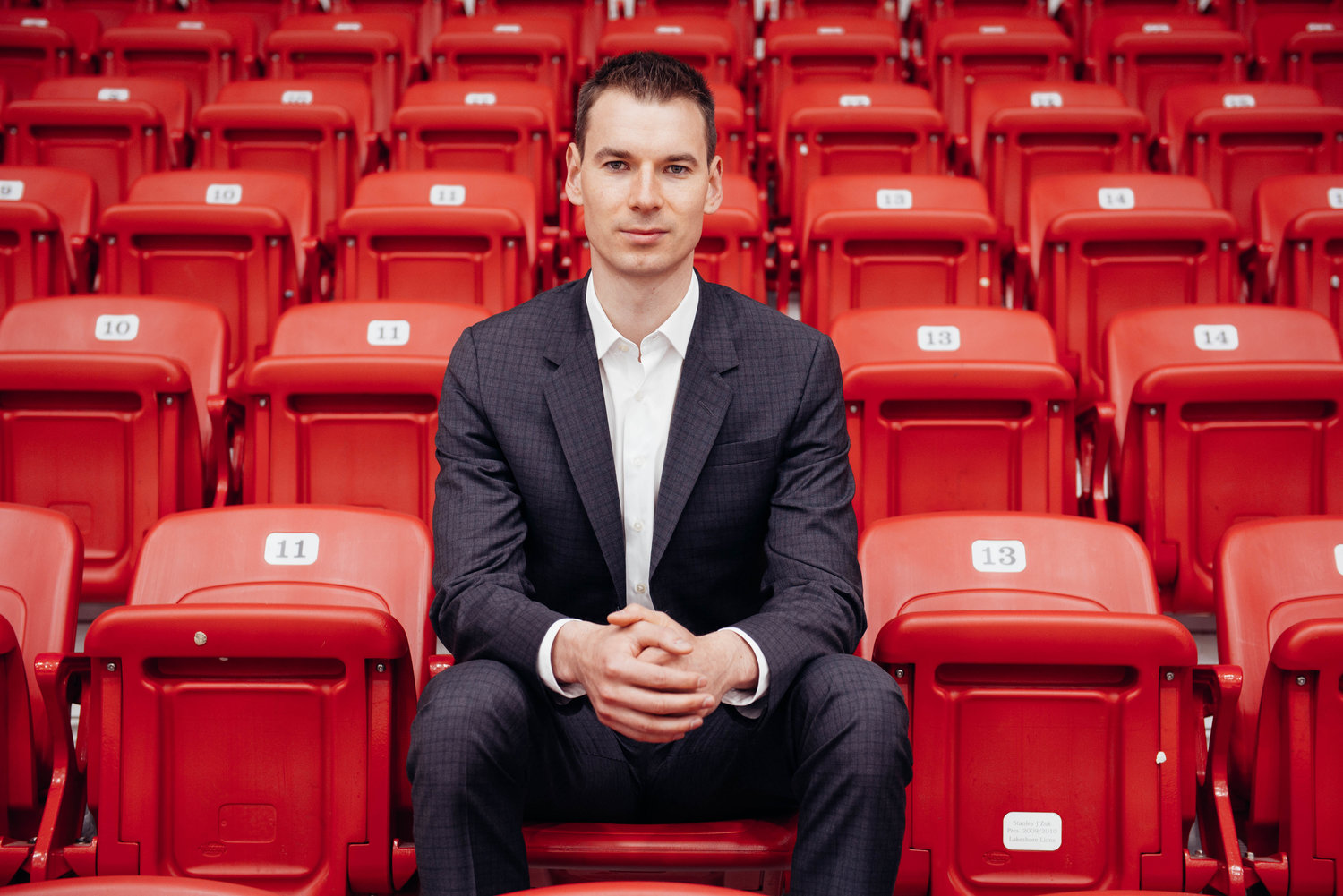Interview by Lance Chung
Photography by Mauricio Calero
At 28 years of age, John Chayka has already written an incredible story for himself. It starts off in small-town Ontario (Jordan Station, to be precise), where Chayka grew up playing hockey with dreams of making it big. After suffering a back injury, however, he was forced to end his athletic career and reassess his way into the game. While most people would have given up altogether, Chayka’s grit and determination led him to push through his limits and find a new path into the NHL for himself.
Fascinated with the analytical side of hockey, Chayka noticed a gap in the industry that could bolster performance (and business). At 19, alongside his sister and close friend, he founded Stathletes Inc., a stats-based company that examines hockey performance on a quantifiable level, giving managers and industry professionals a resource to better achieve success.
For the Ivey Business School graduate, the entrepreneurial experience that Stathletes Inc. provided proved to be a pivotal moment that would send him down his path towards becoming the General Manager of the Arizona Coyotes at just 26 years of age, the youngest in NHL history (and a vote of confidence for a fresh new perspective on the business of hockey.)
In collaboration with luxury auto brand BMW, Bay Street Bull spent some time on and off the ice with Chayka and the new 2017 BMW 5 Series to talk about how he’s beat the odds, pushed his limits, and become hockey’s tech-savvy dark horse.


You started your career on the ice as a hockey player but later had to part from that dream because of a back injury. What was that moment like for you?
It was tough. Growing up in Canada as a kid, you always think that you’re going to play in the NHL yourself. For me, I had a good junior career. I was planning on going to college on a scholarship and came right up against some injuries, which forced me to stop playing. For me, [that experience] was more motivation and inspiration than anything. I could take a new path, adapt and find another way to get to the NHL. My goal was to get involved with hockey as a career, and I accomplished that through this. That was certainly a difficult moment, but adversity is not a bad thing all the time. You learn from it, take what you can, and move forward.
How were you able to use those circumstances to pivot and make an opportunity for yourself?
It led to me starting my first business. From there, I decided I was going to be an entrepreneur. I thought it would be nice to help younger kids that were trying to pursue the same goals that I was. So I started a training facility that offered both on-ice and off-ice training. I was trying to eliminate those injury risks that kids have. As I worked through that I founded my next business, which led to future opportunities.
Did you always have this entrepreneurial spirit?
My dad was an entrepreneur. It was watching him over the years. He was the biggest hustler, and I got that from him. You have to hustle because no one’s going to give it to you. For me as a young person in business, if you’re not going after it, you’re not going to get it.
What was the best advice that he gave to you?
Don’t stop. He was a guy that never took no for an answer. He was more of a sales and marketing kind of person. For him, his view on that business was that failure was 90 percent of it. It’s the other 10 percent that you sell where you make a living. For me, like I said, I had some shortcomings but I put it together. You hit a few home runs and away you go.
Why was Stathletes such a natural progression for you? Have you always had an interest in the analytical side of things?
I think it was more from my playing days. I would be frustrated with the lack of complexity in the sport. There were some coaches and people who didn’t have much of a background in hockey or understand the game. They did things the same way that they were done in the past. That was frustrating at times. As I started my first business, I realized that there is a real lack of objectivity in the sport. It was missing the ability to quantify the game and see it through a more academic lens. As I was working with these young players, I felt like I could really help them and understand their game better through strengths and weaknesses, and video analysis. I built up a good reputation in the sport of being someone who could quantify the game and help players understand it at a deeper level. That’s what led me to Stathletes.


When you came on board as the new GM of the Arizona Coyotes, analytics was still something that was more or less brushed off as a legitimate way to cultivate a team and build a business. What challenges did you face to prove that you, as the new blood, had something worth paying attention to?
To be honest with you, it’s something you have to just get over. You have to deal with it internally before you deal with it externally. I went into the hockey industry, which is very much an old boys system with a lot of history and people with experience. You just have to accept that and understand the parameters of it. For me, it was always something where I was going to stick to my principles and do what I need to do. I have a record just like everybody else, that’s the nice part about sports. It’s pubic record and everyone can look at it and see where it is. As I move forward here, we’ll see if my record still stands. So that was my approach.
You became the youngest GM in NHL history when you assumed your current position. How did you deal with the pressure to build this team in your vision?
There’s pressure you place internally on yourself when you’re in that role. Our franchise has gone through some turbulent times and we really need our team to take a step into good times. It helps the community, it helps the state, and it helps the game of hockey. The desert’s not exactly a natural fit for hockey. It’s important to me, our fans, and our organization, that we have a good team that people can be proud of, that people can watch and have fun with. You have an ownership group that puts a lot of faith in you and believes you can get it done. It’s a dream job. It’s not hard to find the motivation to go to work.
Do you consider yourself a disruptor?
Yeah, absolutely. There’s a lot of technology and young people that I’ve hired and given some significant opportunities to who probably wouldn’t have been hired in those roles under different circumstances. It causes some change and hopefully through it we can be leaders in what we’re doing. I hired the first female coach and she was excellent this year for us and helped us in a lot of ways. Those are things that just haven’t been done before. Diversity is a good thing and something we’re looking to take advantage of.
Hockey is all about the team—success is never hinged on one single person. Numbers aside, what qualitative aspects do you look for when you are building your team on and off the ice?
Just good people. People who are selfless and like-minded with the same goal. People who are willing to sacrifice for those things. That’s how teams win. I’ve never been on a team that doesn’t get along, that doesn’t have success. But it’s a question of do they have success because of good team chemistry? Or do they have good team chemistry because of team success? It’s a little bit of both, but at the end of the day, we need good people to do good things to have success.
You talk about diversity and that’s obviously a big part of today’s dialogue. How has diversity been reflected in your work?
I think people are biased towards certain personalities and types of people and who they’re comfortable with. There’s certainly some value in feeling comfortable and having people that you like on your team. At the end of the day, we all know that it’s not [my] idea, there’s research out there that shows that the more diverse the workplace, the more successful and congenial it is. For me, I really place an emphasis on our group, on the ice and off, that we have different mindsets and personalities and perspectives. That way, we just get better results.


Similar to an athlete’s ability to react quickly in the game, what has helped you be an agile decision maker to changing circumstances in the business?
I think it just comes back to my approach where I’m not really tied to any traditional methods or classical methods in dealing with things. When something comes up and it’s a better idea, or something that I want to do next, then I just do it. Obviously there’s analysis and alternatives that you do to understand what the best route forward is, but I’m not tied to anything so I go ahead and I make the best decision.
How much of that is instinctual?
At the end of the day, in my job, you do a ton of research and analysis. You look at everything in every different way and there are opportunities that arise or don’t arise, and you have to be able to make split-second decisions. Your intuition is probably not just intuition, it’s based off a lot of understanding and analysis that’s done beforehand. But the reaction you make is an instinctive reaction.
You’ve been in your position for just over a year. What have you learned? What’s been your biggest challenge?
I’ve learned that change is difficult for everyone. The easiest thing is to go with the status quo and that keeps things simple and easy. For our organization, you have to do things differently. Just based off the economics of the market and where we are as a team, we have to pursue different avenues that are less traditional than others. So it’s hard. It’s hard to do the right thing, but that’s why it’s the right thing and not many people are doing it. And that’s what separates you.
The biggest challenge is where our team is right now. We’re starting with a rebuild and that has its challenges that go along with it. But again, it just comes back to doing the right thing. It’s hard and you have to just push through and do it because you believe in it at the end of the day.
It’s all connected for me. I’m looking forward to the time when a lot of these hard decisions that we’ve made will pay off. We have a great group of young players that are all growing together and get along really well. They’re a bunch of leaders and good people that I think will do something special as a group. They’re all 19 to 22-years-old right now, and they’re getting to an age where they can take that step. It will be special when they get there.
What does winning mean to you?
I just think it’s the continual search for a new way, and for progress and improvement. I’m a winner at heart without a doubt, but at the same time, there’s a process that you have to go through to win. Sometimes you can win a game that you should lose and vice-versa. For me, it’s all about taking steps forward and that continual drive to improve and succeed.
For more information on the all-new 2017 BMW 5 Series, head over to BMW.ca/5Series








